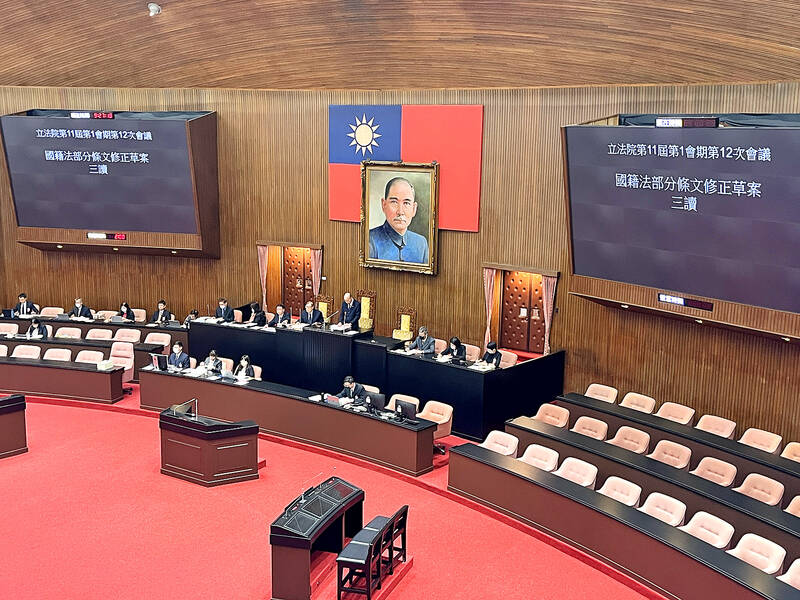The Legislative Yuan yesterday passed on third reading an amendment to the Nationality Act (國籍法) that would reduce the minimum residency period required for highly skilled professionals to apply for naturalization from three to two continuous years, with a minimum of 183 days in Taiwan each year.
The 183-day requirement does not apply if an eligible applicant has lived legally in the territory of the Republic of China for more than five continuous years.
Taiwan’s professional basketball leagues are expected to benefit from the amendments, which would allow them to recruit more players from overseas.

Photo: Lee Wen-hsi, Taipei Times
Prior to the passage of the amendment, the national basketball association had petitioned the Ministry of the Interior and the Sports Administration to allow naturalization after just a two-year stay after taking into account players’ performances to facilitate recruitment of foreign players.
New Taipei Kings forward Quincy Davis and Hsinchu Lioneers forward William Artino became naturalized Taiwanese using the same model, the association said.
The Executive Yuan said the amendment was introduced to attract foreign professionals and talent to Taiwan, and increase incentives for naturalization, adding that the requirements on the length of stay are relaxed for applicants, who would not be asked to relinquish their original nationalities.
Based on the amendment, foreigners who are deemed to be senior-level professionals following a review by the Ministry of the Interior would be eligible.
Foreigners or stateless people who have made outstanding contributions to Taiwan are exempt from the application fee.
To address issues arising from the uncertain status of non-Taiwanese nationals, the amendment also allows stateless children to apply for naturalization with assistance from social welfare agencies or institutions, through which they can access social welfare services, medical care, schooling rights and other protections.
Meanwhile, as the Civil Code has lowered the age of majority to 18, the amendment also states that naturalized people can apply for naturalization for their “unmarried children who are under 18 years old,” rather than “children who are minors.”
Democratic Progressive Party Legislator Lo Bi-ling (羅美玲) said that many countries have recruited naturalized citizens whose expertise boost their prowess in sports and other disciplines, particularly when they face challenges of an aging society and labor shortages.
“Hopefully, the change would encourage more people to become naturalized citizens,” Lo said.

Alain Robert, known as the "French Spider-Man," praised Alex Honnold as exceptionally well-prepared after the US climber completed a free solo ascent of Taipei 101 yesterday. Robert said Honnold's ascent of the 508m-tall skyscraper in just more than one-and-a-half hours without using safety ropes or equipment was a remarkable achievement. "This is my life," he said in an interview conducted in French, adding that he liked the feeling of being "on the edge of danger." The 63-year-old Frenchman climbed Taipei 101 using ropes in December 2004, taking about four hours to reach the top. On a one-to-10 scale of difficulty, Robert said Taipei 101

Nipah virus infection is to be officially listed as a category 5 notifiable infectious disease in Taiwan in March, while clinical treatment guidelines are being formulated, the Centers for Disease Control (CDC) said yesterday. With Nipah infections being reported in other countries and considering its relatively high fatality rate, the centers on Jan. 16 announced that it would be listed as a notifiable infectious disease to bolster the nation’s systematic early warning system and increase public awareness, the CDC said. Bangladesh reported four fatal cases last year in separate districts, with three linked to raw date palm sap consumption, CDC Epidemic Intelligence

Two Taiwanese prosecutors were questioned by Chinese security personnel at their hotel during a trip to China’s Henan Province this month, the Mainland Affairs Council (MAC) said yesterday. The officers had personal information on the prosecutors, including “when they were assigned to their posts, their work locations and job titles,” MAC Deputy Minister and spokesman Liang Wen-chieh (梁文傑) said. On top of asking about their agencies and positions, the officers also questioned the prosecutors about the Cross-Strait Joint Crime-Fighting and Judicial Mutual Assistance Agreement, a pact that serves as the framework for Taiwan-China cooperation on combating crime and providing judicial assistance, Liang

US climber Alex Honnold left Taiwan this morning a day after completing a free-solo ascent of Taipei 101, a feat that drew cheers from onlookers and gained widespread international attention. Honnold yesterday scaled the 101-story skyscraper without a rope or safety harness. The climb — the highest urban free-solo ascent ever attempted — took just more than 90 minutes and was streamed live on Netflix. It was covered by major international news outlets including CNN, the New York Times, the Guardian and the Wall Street Journal. As Honnold prepared to leave Taiwan today, he attracted a crowd when he and his wife, Sanni,